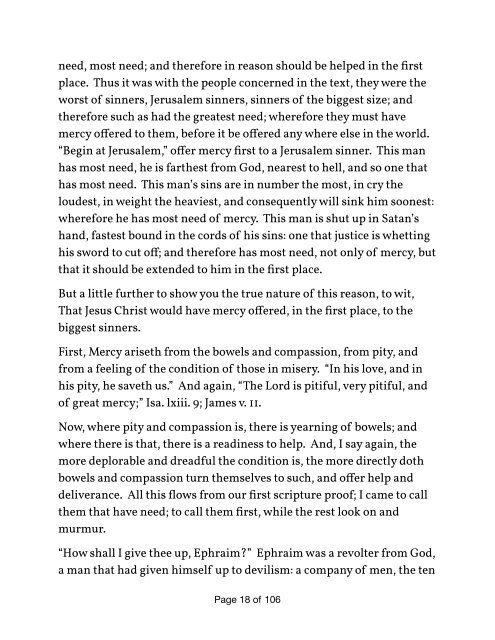The Jerusalem Sinner Saved; or Good News for the Vilest of Men by John Bunyan 1689
An encouraging book for those who feel guilty about their sins. It is a wonderful reminder that Christ's grace to his people knows no bounds and that his power to save even the worst sinner is not limited. "I have been vile myself, but I have obtained mercy; and I would have my companions in sin partake of mercy too: and therefore, I have writ this little book." Thus wrote John Bunyan about this unique gem. The premise of this book is that Jesus wanted his disciples to proclaim the gospel to the worst of sinners - those in Jerusalem who crucified their Messiah. To Bunyan's mind, this was the worst possible sin. The apostles were to begin there, with these worst of sinners, because, in Christ's eyes, they had the greatest need. Also, when they believed in Christ, his name would receive the greatest fame, and thus others would be encouraged to come to Christ. The kingdom of Satan would then be weakened, and the tempted and the weak would be helped. Further, the greatest sinners would love Christ the most when saved, and those who refused to repent would be left with no excuse. To Bunyan's way of thinking, this command to preach the gospel to "Jerusalem sinners" shows the gracious intentions of Christ toward men and his sufficiency to save the worst of sinners, and gives encouragement to those who think that their sin is too great to be forgiven.
An encouraging book for those who feel guilty about their sins. It is a wonderful reminder that Christ's grace to his people knows no bounds and that his power to save even the worst sinner is not limited.
"I have been vile myself, but I have obtained mercy; and I would have my companions in sin partake of mercy too: and therefore, I have writ this little book." Thus wrote John Bunyan about this unique gem.
The premise of this book is that Jesus wanted his disciples to proclaim the gospel to the worst of sinners - those in Jerusalem who crucified their Messiah. To Bunyan's mind, this was the worst possible sin. The apostles were to begin there, with these worst of sinners, because, in Christ's eyes, they had the greatest need. Also, when they believed in Christ, his name would receive the greatest fame, and thus others would be encouraged to come to Christ. The kingdom of Satan would then be weakened, and the tempted and the weak would be helped. Further, the greatest sinners would love Christ the most when saved, and those who refused to repent would be left with no excuse. To Bunyan's way of thinking, this command to preach the gospel to "Jerusalem sinners" shows the gracious intentions of Christ toward men and his sufficiency to save the worst of sinners, and gives encouragement to those who think that their sin is too great to be forgiven.
You also want an ePaper? Increase the reach of your titles
YUMPU automatically turns print PDFs into web optimized ePapers that Google loves.
need, most need; and <strong>the</strong>ref<strong>or</strong>e in reason should be helped in <strong>the</strong> first<br />
place. Thus it was with <strong>the</strong> people concerned in <strong>the</strong> text, <strong>the</strong>y were <strong>the</strong><br />
w<strong>or</strong>st <strong>of</strong> sinners, <strong>Jerusalem</strong> sinners, sinners <strong>of</strong> <strong>the</strong> biggest size; and<br />
<strong>the</strong>ref<strong>or</strong>e such as had <strong>the</strong> greatest need; wheref<strong>or</strong>e <strong>the</strong>y must have<br />
mercy <strong>of</strong>fered to <strong>the</strong>m, bef<strong>or</strong>e it be <strong>of</strong>fered any where else in <strong>the</strong> w<strong>or</strong>ld.<br />
“Begin at <strong>Jerusalem</strong>,” <strong>of</strong>fer mercy first to a <strong>Jerusalem</strong> sinner. This man<br />
has most need, he is far<strong>the</strong>st from God, nearest to hell, and so one that<br />
has most need. This man’s sins are in number <strong>the</strong> most, in cry <strong>the</strong><br />
loudest, in weight <strong>the</strong> heaviest, and consequently will sink him soonest:<br />
wheref<strong>or</strong>e he has most need <strong>of</strong> mercy. This man is shut up in Satan’s<br />
hand, fastest bound in <strong>the</strong> c<strong>or</strong>ds <strong>of</strong> his sins: one that justice is whetting<br />
his sw<strong>or</strong>d to cut <strong>of</strong>f; and <strong>the</strong>ref<strong>or</strong>e has most need, not only <strong>of</strong> mercy, but<br />
that it should be extended to him in <strong>the</strong> first place.<br />
But a little fur<strong>the</strong>r to show you <strong>the</strong> true nature <strong>of</strong> this reason, to wit,<br />
That Jesus Christ would have mercy <strong>of</strong>fered, in <strong>the</strong> first place, to <strong>the</strong><br />
biggest sinners.<br />
First, Mercy ariseth from <strong>the</strong> bowels and compassion, from pity, and<br />
from a feeling <strong>of</strong> <strong>the</strong> condition <strong>of</strong> those in misery. “In his love, and in<br />
his pity, he saveth us.” And again, “<strong>The</strong> L<strong>or</strong>d is pitiful, very pitiful, and<br />
<strong>of</strong> great mercy;” Isa. lxiii. 9; James v. 11.<br />
Now, where pity and compassion is, <strong>the</strong>re is yearning <strong>of</strong> bowels; and<br />
where <strong>the</strong>re is that, <strong>the</strong>re is a readiness to help. And, I say again, <strong>the</strong><br />
m<strong>or</strong>e depl<strong>or</strong>able and dreadful <strong>the</strong> condition is, <strong>the</strong> m<strong>or</strong>e directly doth<br />
bowels and compassion turn <strong>the</strong>mselves to such, and <strong>of</strong>fer help and<br />
deliverance. All this flows from our first scripture pro<strong>of</strong>; I came to call<br />
<strong>the</strong>m that have need; to call <strong>the</strong>m first, while <strong>the</strong> rest look on and<br />
murmur.<br />
“How shall I give <strong>the</strong>e up, Ephraim?” Ephraim was a revolter from God,<br />
a man that had given himself up to devilism: a company <strong>of</strong> men, <strong>the</strong> ten<br />
Page<br />
18 <strong>of</strong> 106

















